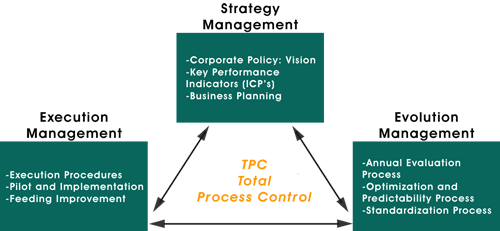Process Management Consulting
Implementing best practices in Business Process Management
Our mission is to make sure our clients have the
most effective BPM tools to help manage their
business processes resulting in a revitalized company, and reducing the
time and expense
required to achieve operational success.
Our senior team of consultants is qualified to
run BPM projects that manage a company’s
core life cycle. The process is divided into the following steps:
• |
Mapping &
Diagnostics |
• |
System Architecture
Design |
• |
Project Execution |
• |
Prototype &
Validation |
• |
Deployment
in Production |
• |
Continued Support |
• |
Annual Evolution
Plan |
• |
Process Management Training |

The methodology on which the Control Business
platform is established is called Total Process Control (TPC).
It incorporates best practices recognized by the Business Process Management
(BPM) concept, ensuring
the consistency and quality needed so that every project objective is
successfully accomplished.
TPC consists in determining each step in the project, from the pre-sales
cycle until the system is in full
operation, and when the responsibility for tracking and monitoring improvements
is transferred to
Control Business’s support department.
MONITORING THE EXECUTION
Project Management
All our consultants are TPC-certified, and
are able to monitor the entire project scope. This includes the
project planning, execution, acceptance, quality certification, risk,
and the management of change within the company
Change Management
Transformations in a company during any project
are inevitable, making the effective management of
change, a determining factor for a successful implementation. The TPC
methodology identifies, isolates and
defines each one of the steps involved in the project so that authorized
changes are made according to all
necessary safety procedures. If a change requires adjustment to the initial
plan, the process makes sure such
adjustment is properly evaluated and redefined.
Acceptance Points
The TPC methodology ensures that all parts
involved are aware of the project’s evolution from start to finish,
which will enable a series of check points that were planned throughout
the development of the project.
This provides that everyone involved will have several opportunities to
participate in the project’s status
checking and progress assessment.
PROJECT EXECUTION
Phase One: Mapping
& Diagnostics
Our consultants work together with the client in this phase to assess
the current situation,
determine the resources and people involved, perform a needs analysis
and establish the
priorities within the organization.
Phase Two: System
Architecture Design
In this phase, our consultants, in conjunction with the client’s
team, hold in depth sessions to
assess and define the client’s requirements. This results in a detailed
design of the recommended
solution architecture. This phase’s final result enables all parties
involved to have the opportunity
to check if their business process needs were correctly defined and configured.
Phase Three: Project
Execution
This phase includes the steps needed for the development of the system
designed up to the stage
where it is ready for the Prototype phase. A detailed plan gives the project
team a clear understanding
of all the aspects that concern the systems installation, parametrization,
configuration, testing,
generic data loading, event preparation, basic training, preliminary reporting,
and initial documentation requirements.

Phase Four: Prototype & Validation
The prototype phase consists of the integration testing, connectivity testing, performance
simulations, data loading, backup, and recovery steps. After completing these steps, the user
must formalize the prototype validation.
Phase Five: Deployment
in Production
All processes required to put the system into production are completed
in this phase:
advanced training, product installation in the production environment,
production data loading
(dynamic and historical), system certification, documentation, and final
report structuring.
Phase Six: Continued
Support
The continued support phase starts when the system production begins.
This phase can include
on-site support in the period immediately after the previous phase. Documentation
of implementation
details are sent to Control Business’s support department so that
customized support can be provided.
Phase Seven: Annual
Evolution Plan
The TPC methodology’s objective is to achieve the highest level
of performance by monitoring through
annual analysis, the system’s evolution. The evolution plan contemplates
analysis reports elaborated
once a year, in order to make sure that the system is continually assessed
and properly enhanced and
adapted to the client’s new realities.